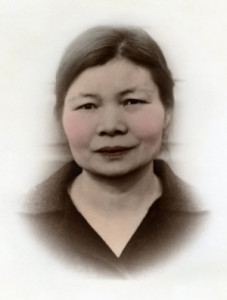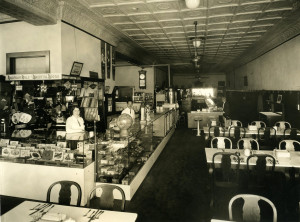Nebraska has had a small Japanese-American population since the early 1900’s. Richi Ugai of North Platte, Nebraska, was a prominent figure for the Japanese-American community. The restaurateur and hotel owner became a well-known businessman in the early twentieth century, prospering even through anti-Japanese sentiments of World War II. The full article can be found in the 2015 winter article written by Griffen Farrar.
The first generation of Japanese immigrants known as Issei played an important role in shaping the future for their children, the Nisei, and their grandchildren, the Sansei. After Japan opened up the Meiji Restoration in 1868, the first Issei traveled to the United States and relocated to a variety of different states because of their railroad jobs. This is how seven hundred Issei men ended up in Nebraska, including Richi Ugai.
Born in Hiroshima in western Japan, Ugai grew up in a poor family and dreamed of living the “American dream.” On January 15th, 1903 Ugai seized the opportunity to live in California and a year later he moved to North Platte, Nebraska. He was one of the first people of Japanese ancestry to settle in this area of the state. Ugai played a prominent role in the development of North Platte Valley’s Japanese community through his business ventures and community involvement.
Ugai first appeared in the North Platte city directory in 1907, listed as a porter for the Union Pacific Hotel. Soon afterwards, he left the hotel and began working for Palace Café. He became partners with Ben Nakashima, another Issei. The partnership lasted roughly two years and Ugai bought out Nakashima’s share of the business. Ugai took Palace Café to new heights and employed 15 Issei men, according to the 1910 census
As Ugai made a name for himself, he was not afraid of displaying his wealth by buying four lots of property, a Chalmers automobile and a piano from the Hershey Company. After owning Palace Café for six years, Ugai purchased land beneath and next to the café totaling $27,000 worth of land He expanded his business by building the Hotel Palace in 1918. Ugai then launched the Palace Bazaar in the back of the Hotel Palace in 1921. The bazaar specialized in traditional Japanese items such as kimonos, tea and fine china. Ugai promoted his new business with large newspaper ads that showcased the uniqueness of the restaurant. The café and hotel continued to be Ugai’s main businesses, but he further diversified when he began to buy and sell typewriters in the 1920’s. He also purchased stock in businesses such as the North Platte Air Terminal Company. Ugai’s diverse interests not only illustrate his ability to seize opportunities where other many hesitate, but they also set him apart as one of the few Asian men of his era who managed to integrate himself fully into the business environment of his adopted country.
Twenty years later, in 1941, information reached Nebraska about the Japanese attack on Pearl Harbor. The western Nebraskan Japanese wanted to distance themselves from any activity that might raise suspicions of their loyalty. These measures allowed for a relatively calm life, unlike the West Coast, where Japanese were sent to internment camps. Three out of four of Ugai’s children entered military service, while Ugai continued to work at the café. Unlike other Japanese-owned cafés, the Palace Café was never threatened during war. Although his business was across the street from the famous North Platte Canteen, there was no evidence that anyone vandalized Ugai’s business. Ugai’s family never had to relocate during the war, and all four of Ugai’s children survived the war and returned home to North Platte. Coming to America with nothing, Richi Ugai made a name for himself in less than five years and became one of North Platte’s most prominent businessmen in little over a decade. Throughout his career, he worked hard and invested boldly to promote and expand his businesses. All of his children attended college and three of the four purchased land and property from him in 1953. While few outside North Platte knew Richi Ugai personally, his contribution to Japanese community reached across the state.

Shiyao Ugai

Palace Cafe Interior



